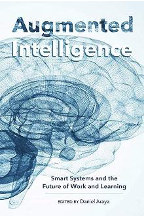Publication Details
| OLOR Series: | ROLE Reviews |
| Author(s): | Joni Boone |
| Original Publication Date: | 15 March 2020 |
| Permalink: |
<gsole.org/olor/reviews/2020vol3no1.rev6> |
Publication Note
This review was originally published in Research in Online Literacy, vol. 3, no. 1 (2020).
Resource Overview
Media, Figures, Tables |
Resource Contents
Review of Augmented Intelligence
The topic of artificial intelligence can become quite frightening, as science fiction writers and shows like Black Mirror posit nightmare scenarios where humans lose control to a world dominated by technology. In reality, however, we often learn to harness technology in an attempt to better our lives and the lives of others. Technology is a powerful force in the workplace and education, and understanding the role of augmented intelligence (AI) – using technology to complement rather than replace human intelligence– may help to alleviate some concerns for the future in the computational age. Augmented Intelligence: Smart Systems and the Future of Work and Learning tackles the issue of how our society may function in the future with further integration of technology into our daily lives.
The book opens with a comparison between the benefits and challenges of AI in Colin G. Harrison’s chapter “Augmented Intelligence and Society.” This comparison provides a helpful backdrop of themes that emerge among other chapters in the book such as AI’s role in creative problem solving and various types of intelligence. The idea that technology will provide opportunities for enhanced human creativity is emphasized in a discussion on the future of cognitive assistants/coaches working alongside employees (chapter 2) and in a discussion on the importance of policymakers in mitigating further class divides in the workplace (chapter 3). Howard Gardner’s theory of Multiple Intelligences also arises throughout the book (chapters 5, 7, and 9) as authors explore what types of intelligences technology can truly enhance through AI and the implications of those enhancements on human development and the workplace.
Transparency, trust, control, and dependency are other ethical considerations authors discuss in the book. Perhaps the most detailed examination of these types of ethical issues appears in Chapter 5, “Intelligence Augmentation: Uploading Brain into Computer: Who First?” The notion of a human’s thoughts, memories, and experiences being completely transparent to the world in order for their brain to be uploaded into a computer for reproduction and expansion is an exhilarating and terrifying thought. All involved must carefully consider risks of selecting donors and providing effective policy to safeguard stakeholders, as the authors suggest.
The workplace continues to change as we move further into the computational revolution, and what seems like futuristic science fiction may not be far from reality. As a result, educators must be aware of the evolving needs of the workplace, policymakers must stay current on innovations and trends, and the public may struggle to keep up with the changes. This book illuminates theories, questions, and implications for the future of AI in the workplace with both enthusiasm and caution that educators can appreciate. Contributors include scientists, researchers, former government advisors, statisticians, former military personnel, and educators from a variety of fields, giving the book a breadth of perspectives on this fascinating topic.
About the Reviewer
Joni Boone has a master's degree in English and has taught and tutored composition for 15 years. For the past 4 years, she has been a faculty developer at an online university. Her research interests include multimedia feedback, plagiarism trends and prevention, and personality type in organizations and education.



 Augmented Intelligence: Smart Systems and the Future of Work and Learning
Augmented Intelligence: Smart Systems and the Future of Work and Learning